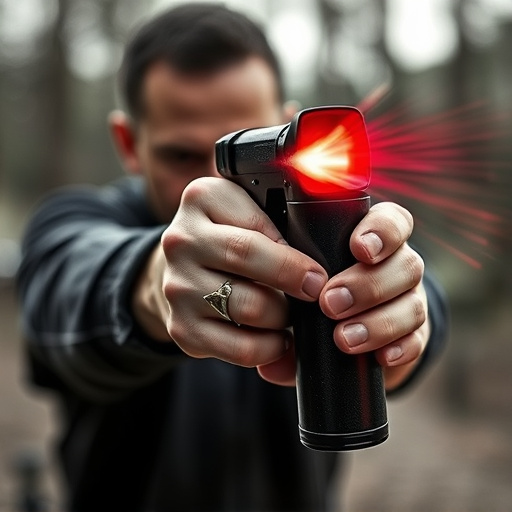TL;DR: Using pepper spray in the presence of pets can cause severe reactions, including respiratory distress and eye irritation. Immediate actions include moving pets to a well-ventilated area, rinsing eyes and nose with warm water, and providing supportive care. Veterinary consultation is crucial for persistent symptoms. Treating Pets Exposed to Pepper Spray involves diluting the irritant with water, flushing eyes gently, monitoring symptoms, and seeking prompt veterinary care. Prevention includes understanding local laws, conducting drills, training pets, and keeping an updated emergency plan with a first aid kit.
“Learn how to protect your pets from the intense effects of maximum strength pepper spray with this comprehensive guide. From understanding the spray’s active ingredients and immediate symptoms to managing exposure and preventing future incidents, we’ll walk you through every step. Discover essential home treatment methods for pepper spray contact on pets and gain insights into preparing your furry companion for unexpected encounters. Ensure your pet receives the best care after exposure with our expert advice on Treating Pets Exposed to Pepper Spray.”
- Understanding Pepper Spray and Its Effects on Pets
- Immediate Steps to Take After Pet Exposure
- Home Treatment and Care for Pepper Spray Contact
- Preventing Future Incidents and Preparing Your Pet
Understanding Pepper Spray and Its Effects on Pets
Pepper spray, a powerful law enforcement tool designed to incapacitate and deter individuals, can have significant effects on humans. However, its impact on pets is an often-overlooked aspect that requires immediate attention during any self-defense scenario involving animals. When pets are exposed to pepper spray, they may exhibit symptoms such as coughing, sneezing, excessive drooling, difficulty breathing, and extreme irritability. These effects can range from mild discomfort to severe respiratory distress, depending on the concentration of capsaicin, the active ingredient in pepper spray, and the duration of exposure.
Treating pets exposed to pepper spray is crucial. The first step is to move the affected pet to a well-ventilated area to minimize further inhalation of irritants. Rinsing the eyes and nose with warm water can help flush out any residual spray. Additionally, administering oxygen or using a humidifier can aid in clearing the airways and promoting easier breathing. If symptoms persist or worsen, consulting a veterinarian is essential for proper evaluation and treatment.
Immediate Steps to Take After Pet Exposure
If your pet has been exposed to pepper spray, immediate action is crucial for their safety and well-being. The first step is to remove them from the contaminated area as quickly as possible to prevent further irritation or inhalation of the irritant. Rinse the affected areas thoroughly with water; this can help dilute the pepper spray residue and alleviate discomfort. For pets with eye exposure, flush gently but consistently for at least 15 minutes to ensure no trace of the spray remains.
Next, assess your pet’s condition. Look out for signs such as excessive panting, coughing, or difficulty breathing, which may indicate respiratory distress. Keep them calm and warm, and consider seeking veterinary assistance promptly, especially if symptoms persist or worsen. Treating pets exposed to pepper spray involves a combination of supportive care and medical intervention to manage discomfort and prevent potential long-term effects.
Home Treatment and Care for Pepper Spray Contact
If your pet is exposed to pepper spray, it’s crucial to act swiftly and provide appropriate home treatment. The first step is to remove any contaminated clothing or materials from the animal’s contact with the spray. Rinse the affected area thoroughly with cool water for at least 15 minutes, ensuring all traces of the irritant are washed away. This simple yet effective method can significantly alleviate discomfort and prevent further irritation.
For pets with mild to moderate symptoms, such as tearing eyes, coughing, or difficulty breathing, monitor them closely for a few hours. Offer them access to fresh water and a quiet, comfortable space to recover. If symptoms persist or worsen, contact your veterinarian immediately. They can provide specialized care, especially if your pet has any pre-existing health conditions that might complicate the recovery process. Remember, treating pets exposed to pepper spray requires prompt action and professional guidance for optimal animal welfare.
Preventing Future Incidents and Preparing Your Pet
Preventing future incidents is a crucial step in safeguarding both you and your pet from the harmful effects of pepper spray exposure. Start by familiarizing yourself with local laws and regulations regarding the use and possession of pepper spray, ensuring compliance to avoid any legal repercussions. Regularly conduct safety drills at home, practicing how to respond calmly and effectively if exposed to pepper spray or other irritants. Teach your pets basic commands and train them to remain calm during unexpected events, making future incidents less stressful for both you and your furry companion.
Preparing your pet for potential exposure involves understanding their unique needs and vulnerabilities. Consult with a veterinarian to determine the best course of action, including any necessary vaccinations or treatments for existing conditions that could affect how they respond to pepper spray. Keep emergency contact information readily available, including local animal control and veterinary clinics. Ensure you have a well-stocked first aid kit tailored for pets, equipped with items like eye flush solutions, calming aids, and soothing topical creams. Regularly review and update your pet’s emergency plan as their health and needs evolve, ensuring they are always ready for any unexpected challenges.
Understanding the effects of pepper spray on pets is crucial for any responsible pet owner. Knowing what steps to take immediately after exposure, how to provide home treatment and care, and how to prevent future incidents can make all the difference in your pet’s recovery. By following these guidelines on treating pets exposed to pepper spray, you’ll be better equipped to protect your furry companions and ensure their well-being.
